Saints and the Eucharist
Eucharist is at the heart of our lives as Catholics. Many of those the Church recognize as saints in heaven and those on their way were deeply devoted to the real presence of Christ in the Eucharist. Their lives and words offer us a glimpse into how regularly sharing in the Eucharist transformed ordinary people who, in response, gave themselves wholly to proclaiming the Gospel with their lives.
Click on a name to learn about the life of brother or sister in the Communion of Saints and spend a few moments in prayerful reflection inspired by their words.
The National Eucharistic Revival Committee is also sharing profiles of American Eucharistic Witnesses each month from July 2023 to the National Eucharistic Congress in July 2024:
Venerable August Tolton essay for adults | activities for children
Francis Cardinal George essay for adults | activities for children
Blessed Carlos Acutis
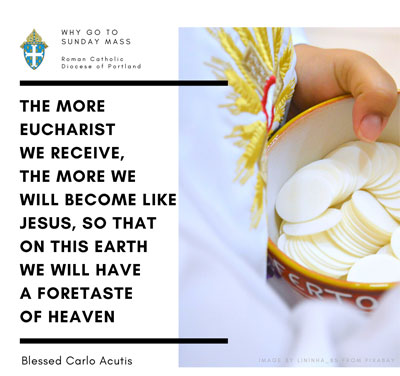 Fruit of his life: Devotion
Fruit of his life: Devotion
Blessed Carlos Acutis was born in London, England on May 3, 1991. Carlos was an ordinary teen with a devotion to the extraordinary. He was an attendee at daily mass and oftentimes persuaded his family members to attend with him. He mingled his love of technology and Catholicism and created a webpage which chronicled Eucharistic miracles around the world. Carlos’ goal for his life was to always be united with Jesus, a goal which he achieved even when he was suffering with cancer. In the midst of the suffering, he said “I offer all suffering I will have to suffer for the Lord, for the Pope, and the Church.” He died on October 12, 2006. Nine days later a Eucharistic miracle occurred.
Take a few moments to be inspired by Blessed Carlos Acutis and his example of devotion to the Catholic faith and the Blessed Sacrament:
- What actions can I take to become more united to Jesus? How can I become more like Jesus?
- How often do I participate in the Mass? Is there a non-practicing Catholic friend or family member whom I could invite to go to Mass with me, in the near future?
St. André of Montreal
 Fruit of his life: Humility & Hospitality
Fruit of his life: Humility & Hospitality
Alfred Bessette was born on August 9, 1845 in Mont Saint Gregoire, Canada. He was of poor health from an early age, so no one expected much from a small, crippled man. However, he trusted in God’s plan which led him to join the Congregation of the Holy Cross and take the name Brother André. He spent the next 40 years as a porter and a healer. Many flocked to the Notre Dame College in Montreal where he answered the door because he made each person feel welcomed, known, loved. St. André died on January 6, 1937. It is estimated that a million people filed past his coffin.
St. André was a man of humility who knew that oftentimes those who seem most unlikely to amount to much are the ones God will work through to accomplish big things. When given praise or credit, he always attributed his work to Saint Joseph to whom he had a devotion. He was a man of hospitality who treated every guest with the utmost respect and dignity and made them feel comfortable in his presence.
Take a few moments to think about the opportunities in your life where you can make people feel known and loved like St. André of Montreal did:
- Do I believe that God can use even the most unlikely of circumstances - such as a pandemic - to do big things in and through our Church?
- How am I communicating to the people in all aspects of my life that they are welcome, known, and loved? Consider how you might become this kind of welcoming presence in your parish.
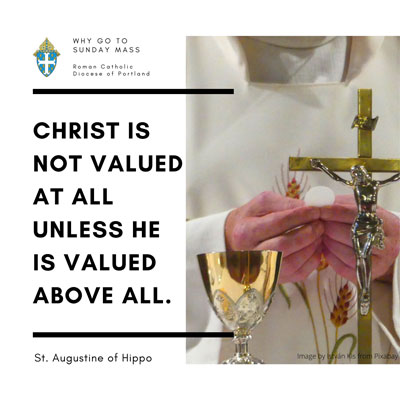 St. Augustine of Hippo
St. Augustine of Hippo
Fruit of his life: Conversion
St. Augustine of Hippo was born in Thagaste, Algeria on November 13, 354 AD. His beginnings were rocky as he engaged in a risky lifestyle. Though his Christian mother, Monica, raised him with the Bible and prayed for him constantly, Augustine did not convert to Christ until his mid 30’s. After hearing the words “take up and read” he reveled in the words of St. Paul which urged him to “put away all impurity and live in imitation of Jesus.” Each day he had to undergo conversion of the heart, mind, and will. Sometimes this conversion meant sacrifice. St. Augustine responded by devoting his life to God, working as a priest, bishop, and Catholic writer. He remained fervent in pursuit of the truth and in prayer until his death on August 28, 430.
Take a few moments to reflect on St. Augustine’s example and how you too are invited to live in imitation of Jesus:
- We are all called to continual conversion, so what in my mind, heart, or will needs to be converted and conformed to Christ today?
- What, if anything, have I put before God and the obligation to attend Sunday Mass? What can I do to make sure that God and the obligation to attend Mass are primary in my life going forward?
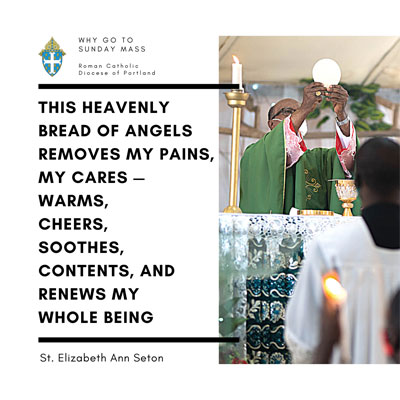 St. Elizabeth Ann Seton
St. Elizabeth Ann Seton
Fruit of her life: Charity
Elizabeth Ann Bayley was born in New York City on August 28, 1774. Her Episcopalian family taught her the value of helping others. At the age of 19 Elizabeth married William Magee Seton and they had 5 children together. Sadly, William’s health deteriorated so the family went to Italy to be near friends. This was a bittersweet trip as William died of tuberculosis, however his friends helped Elizabeth learn about Catholicism. She was drawn to the True Presence of Christ in the Eucharist, devotion to the Blessed Mother Mary, and the apostolic nature of the Catholic Church. In 1805 Elizabeth returned to the United States with her children and was received into the Catholic Church. In 1809 Elizabeth moved to Emmitsburg, Maryland. There she founded the Sisters of Charity of St. Joseph, the first community for religious women established in the United States. She also began schools that set the foundation for Catholic education in the U.S.
The Eucharist was what strengthened and nourished St. Elizabeth Ann Seton to go out and do charitable works. The Catechism of the Catholic Church says “the Eucharist commits us to the poor (1397).” Having received the Eucharist, we too are sent forth to serve God by serving others.
Take a few moments to pray with St. Elizabeth Ann Seton and reflect on how you can too grow in holiness through sharing in the Eucharist and serving the poor:
- After receiving holy Communion, how do I go out and serve others?
- What am I called to do to put faith into practice in my home, in my community, and globally?
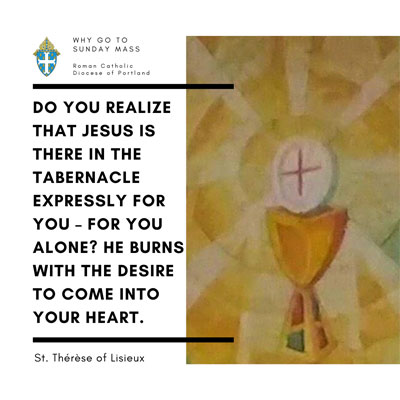 St. Thérèse of Lisieux
St. Thérèse of Lisieux
Fruits of her life: Holiness and trust
Marie Françoise-Thérèse Martin was born on January 2, 1873 in Alenḉon, France. Raised by a pious Catholic family she learned the foundations of Catholicism and developed a love for the Church, especially for the Blessed Sacrament. Thérèse felt God calling her to the Carmelite convent at an early age. After pleading with Pope Leo XII for help, she was allowed to enter the convent at Carmel at age 15. Sr. Thérèse suffered greatly with scruples, depression, and doubts, however her trust in the true presence of Christ in the Eucharist was unwavering. By receiving holy Communion as often as possible she grew in holiness. This simple act made it easier to do things for others with great love because she herself had received great love from the Lord through sharing in the Eucharist. During this time Thérèse developed her “little way,” trusting God as a child does, seeing everything as grace, and responding to ordinary moments life as opportunities to show love.
Thérèse died of tuberculosis on September 30, 1897, at age 24. Her writings on the simple and practical spirituality of the “little way” continued to impact thousands and deepened our understanding of God. Despite her short life and little formal education, Pope Saint John Paul II named St. Thérèse of Lisieux a Doctor of the Universal Church in 1997.
Take a few moments to reflect on the little ways you can grow in holiness and learn to have absolute trust in God like St. Thérèse of Lisieux:
- Where have you encountered God’s love in ordinary things? What did it feel like?
- What helps or gets in your way of trusting that Jesus Christ is truly present in the Eucharist?
- Do you believe that Jesus loves you?
- How has your relationship with Jesus or the Church changed during the Covid-19 pandemic? Maybe for the past 18 months you’ve shut him out, maybe you’ve replaced Him with something else, maybe you haven’t given Him that prime spot in your heart. He longs to come into your heart and live there. Can you let Jesus in and let Him lead?
St. Peter Julian Eymard
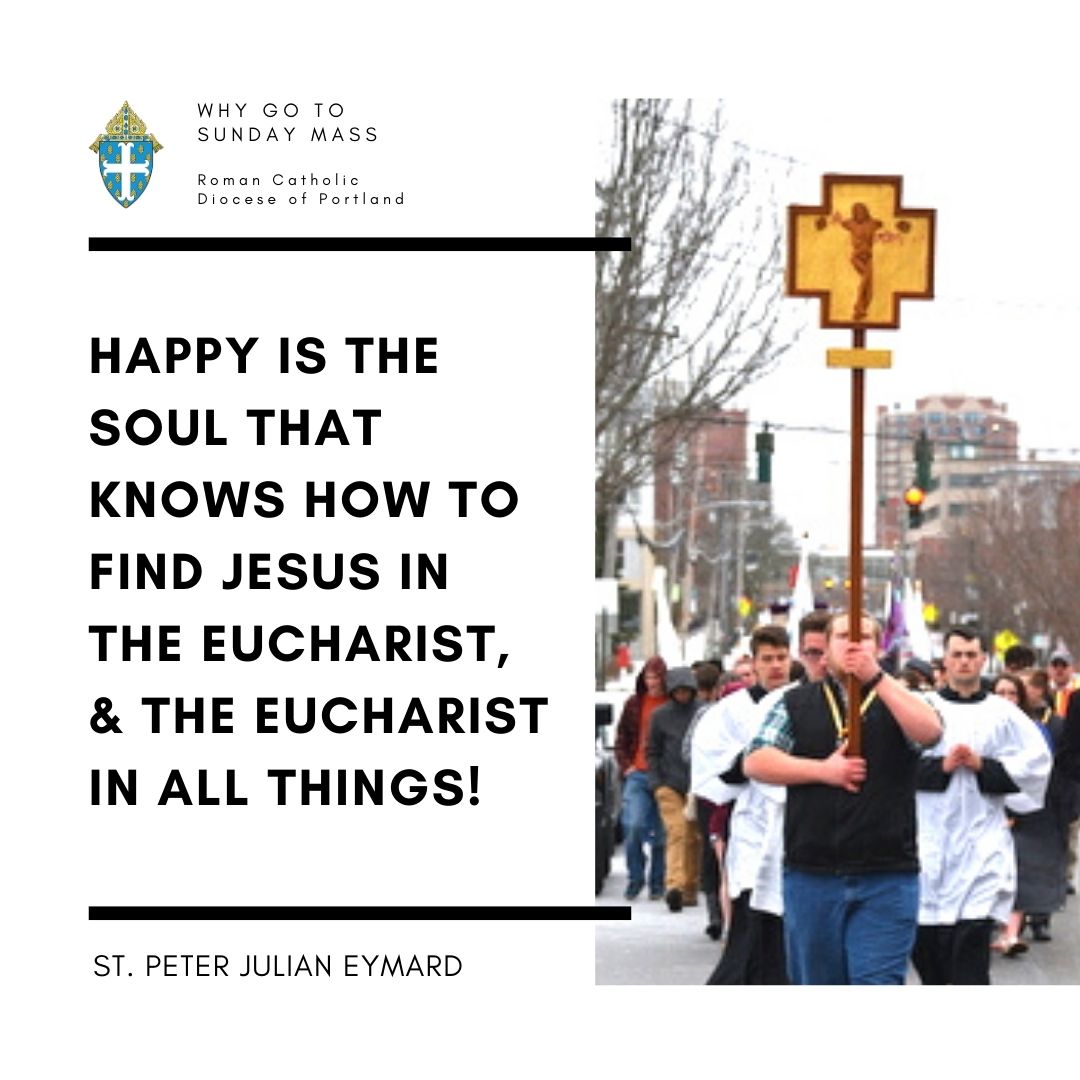
Fruit of his life: Adoration
St. Peter Julian Eymard was born on February 4, 1811 in La Mure d'Isère, France. Despite his father's initial opposition, Peter Julian became a priest showing special care for those who were sick or poor and discerning the call to renew Christian life through the Eucharist as well as deepen formation for laity and priests. Eventually, Fr. Eymard's zeal for the Blessed Sacrament and the practice of eucharistic adoration led to founding two religious congregations that continue to this day: the Servants of the Blessed Sacrament (men) and the Congregation of the Blessed Sacrament (men). Peter Julian stressed both the contemplative and active dimensions of the Eucharist. Fr. Eymard died on August 1,1968 in La Mure after a life striving toward what he described as full "self-donation" to Christ in Eucharistic that helped him remain committed to his call through illness and difficulties and to give thanks for the joys of God's blessings. Pope John XIII canonized him on December 9, 1962 after the close of the first session of the Second Vatican Council.
Take a few moments to be inspired by St. Peter Julian Eymard, the Apostle of the Eucharist:
- When do I take time to contemplate the Eucharist? How do my actions draw others to the real presence of Jesus Christ in the Eucharist?
- What in the Catholic faith do I draw upon to help me face social and political challenges in ways that reflect the love and mercy of Christ shown to us in the gift of the Eucharist? Is there a non-practicing Catholic friend or family member whom I could invite to go to Mass with me, in the near future?









